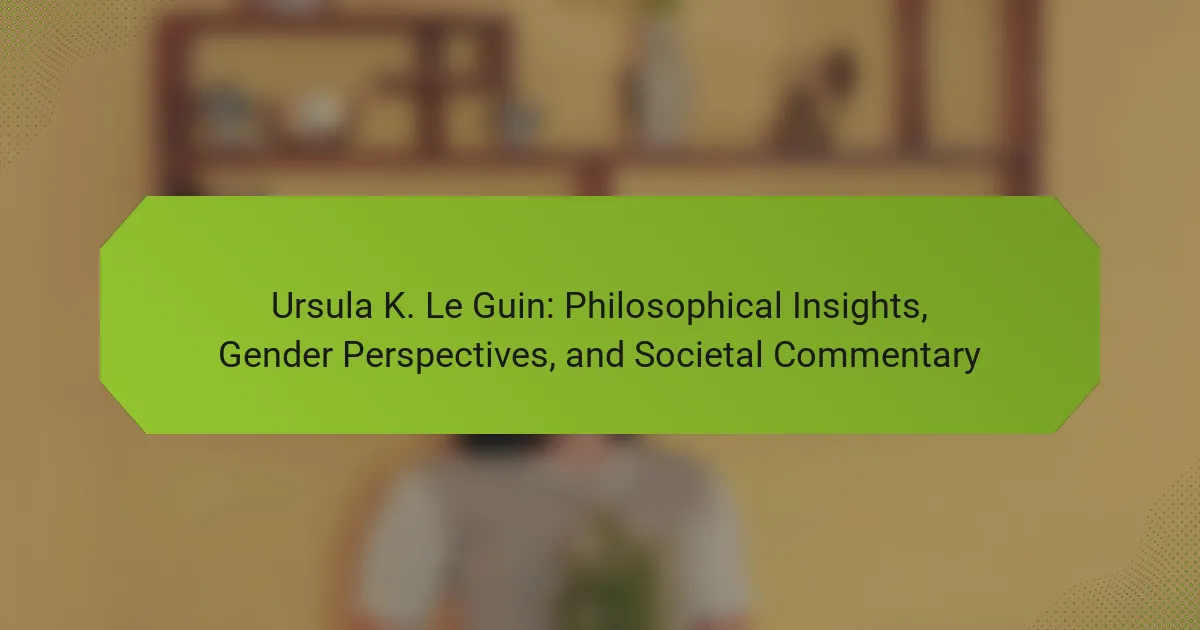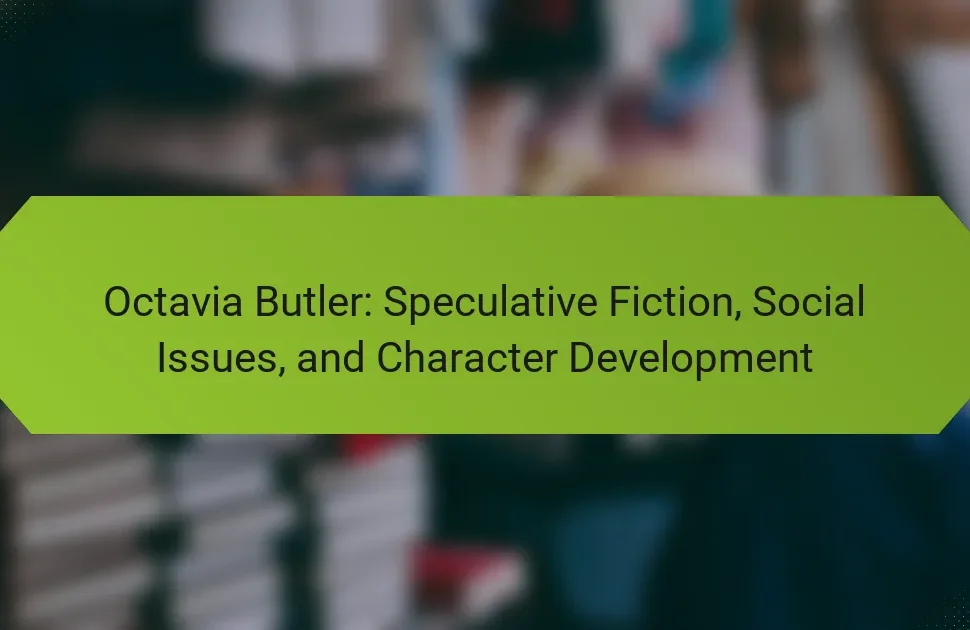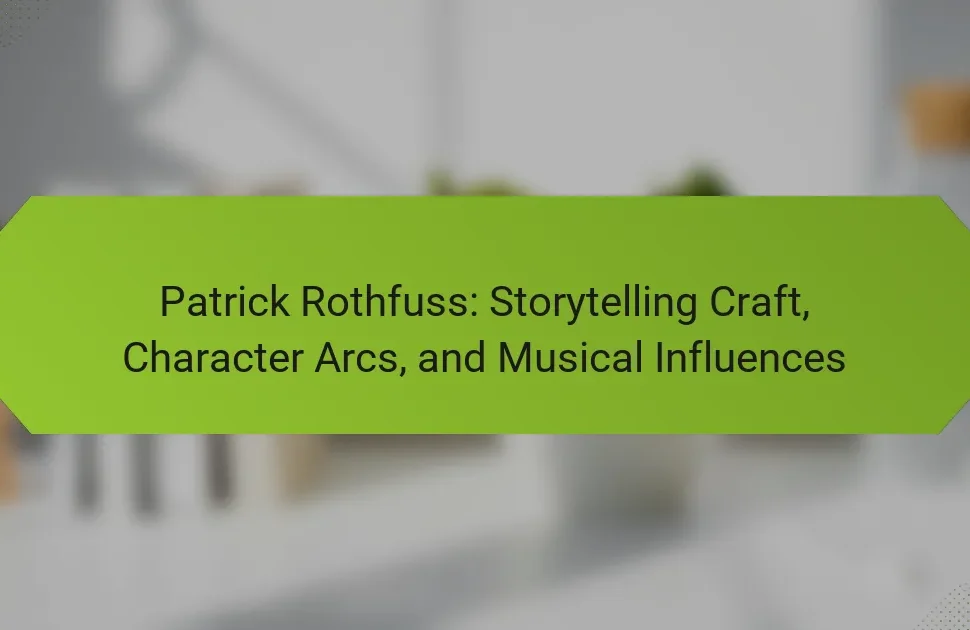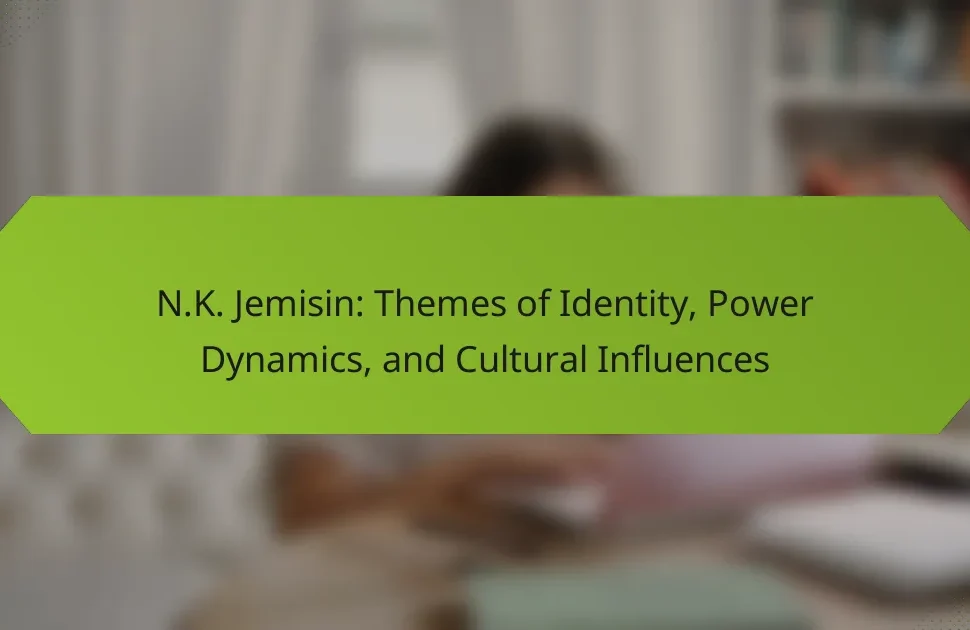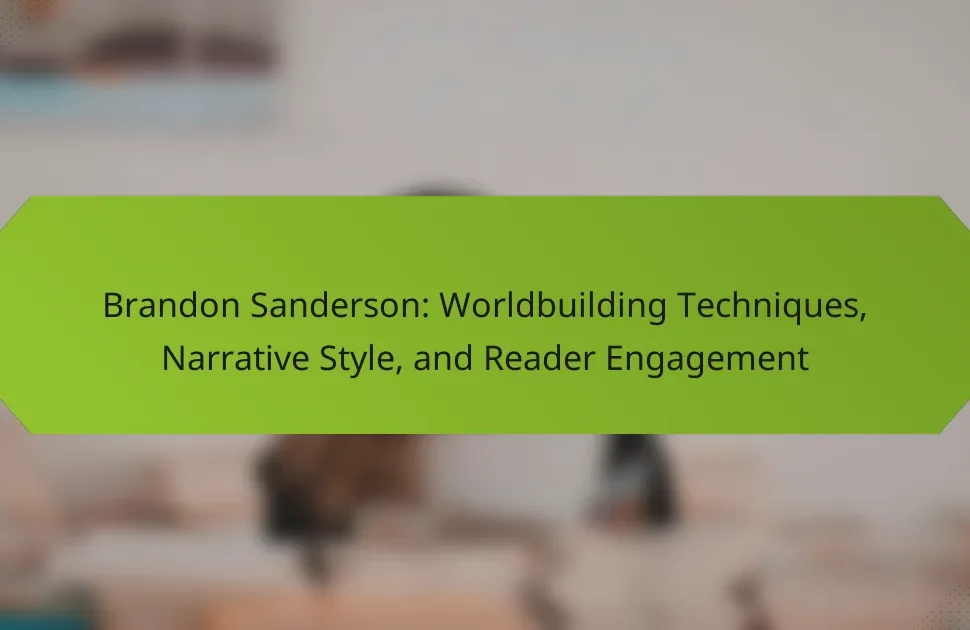Ursula K. Le Guin’s work offers profound insights into philosophy, gender perspectives, and societal commentary. Her narratives challenge conventional norms, exploring identity and morality. Le Guin critiques patriarchal structures and advocates for gender equality. Through intricate world-building, she prompts critical discourse on power dynamics and human experience.

How does Ursula K. Le Guin’s work reflect philosophical themes?
Ursula K. Le Guin’s work profoundly reflects philosophical themes through explorations of identity, morality, and societal structures. Her narratives challenge conventional norms, particularly regarding gender roles and human relationships.
Le Guin’s science fiction often presents alternative societies that provoke thought on political and ethical dilemmas. For instance, in “The Dispossessed,” she examines anarchism and capitalism, showcasing the complexities of freedom and responsibility.
Additionally, her use of speculative fiction allows for a unique exploration of existential questions. This approach invites readers to reflect on their own beliefs and assumptions about reality, making her work a rich source of philosophical inquiry.
Le Guin’s contributions extend to feminist philosophy, where she critiques patriarchal structures and advocates for gender equality. Her insights encourage readers to envision a more equitable society, emphasizing the importance of empathy and understanding in human interactions.
What are the core philosophical concepts in her narratives?
Ursula K. Le Guin’s narratives explore core philosophical concepts such as the nature of reality, the fluidity of identity, and the implications of gender roles. She challenges traditional notions of power and society, advocating for empathy and interconnectedness. Her works often emphasize the importance of balance between opposing forces, such as chaos and order. Additionally, Le Guin delves into the concept of utopia, questioning its feasibility and the moral implications of striving for an ideal society.
How does she explore existentialism and ethics?
Ursula K. Le Guin explores existentialism and ethics through her characters’ journeys, emphasizing personal choice and moral dilemmas. Her works often reflect the tension between individual freedom and societal norms. Le Guin uses speculative fiction to challenge traditional ethical frameworks, inviting readers to consider alternative perspectives on existence. By intertwining gender perspectives, she highlights how societal constructs shape ethical decision-making.
Which philosophical influences shaped her writing style?
Ursula K. Le Guin’s writing style was shaped by existentialism, Taoism, and feminist philosophy. These influences fostered her exploration of identity, society, and the human experience. Existentialism’s focus on individual agency is evident in her character development. Taoism’s principles of harmony and balance inform her world-building. Feminist philosophy challenges traditional gender roles, promoting diverse perspectives in her narratives. These philosophical underpinnings create a rich tapestry that enhances her storytelling and thematic depth.

What gender perspectives are prevalent in Ursula K. Le Guin’s literature?
Ursula K. Le Guin’s literature prominently features gender perspectives that challenge traditional roles. Her works explore themes of gender fluidity, equality, and the social constructs surrounding gender identity. Le Guin often portrays societies where gender is not binary, reflecting her belief in the complexity of human experience. For instance, in “The Left Hand of Darkness,” she presents a world where inhabitants can change gender, emphasizing the fluidity of identity. This unique attribute allows her to critique patriarchal norms and advocate for a more inclusive understanding of gender.
How does she challenge traditional gender roles?
Ursula K. Le Guin challenges traditional gender roles by presenting complex characters that defy stereotypes. Her works often feature women in roles of power, wisdom, and agency, contrasting with societal expectations. For instance, in “The Left Hand of Darkness,” she explores gender fluidity, depicting a society where gender is not fixed. This unique perspective invites readers to question the binary notions of gender and consider a more inclusive understanding of identity. Through her philosophical insights, Le Guin advocates for a re-examination of societal norms, encouraging a shift towards equality and understanding.
In what ways does her work address feminism and matriarchal societies?
Ursula K. Le Guin’s work profoundly addresses feminism and matriarchal societies by exploring gender roles and societal structures. She envisions alternative worlds where matriarchal systems thrive, challenging patriarchal norms. Her narratives often highlight the value of collaboration, empathy, and community, reflecting feminist principles. Le Guin’s unique attribute lies in her ability to intertwine philosophical insights with gender perspectives, prompting readers to reconsider traditional power dynamics. Through her stories, she advocates for equality and the recognition of diverse experiences, making her a pivotal figure in feminist literature.
What unique characters embody her views on gender?
Ursula K. Le Guin’s unique characters challenge traditional gender roles, embodying fluidity and complexity. Characters like Ged from “A Wizard of Earthsea” and the inhabitants of “The Left Hand of Darkness” exemplify her views. Ged’s journey reflects the struggle against societal expectations, while the Androgynous Gethenians highlight the spectrum of gender identity. Le Guin’s narratives often reveal the constraints of binary gender norms, promoting a more inclusive understanding of identity. These characters serve as vehicles for her philosophical insights on gender, emphasizing the importance of empathy and understanding in societal structures.

How does Ursula K. Le Guin critique societal norms?
Ursula K. Le Guin critiques societal norms by exploring themes of gender, power, and identity. Her works challenge traditional roles, advocating for a more fluid understanding of gender and society. In “The Left Hand of Darkness,” she examines how cultural constructs shape perceptions of gender, emphasizing the impact of societal expectations. Le Guin’s philosophical insights encourage readers to question established norms, promoting a vision of equality and understanding. Her literary contributions continue to resonate, inspiring critical discourse on the intersection of society and individuality.
Which societal issues does she address through her storytelling?
Ursula K. Le Guin addresses various societal issues through her storytelling, including gender inequality, environmental concerns, and cultural identity. Her narratives challenge traditional gender roles, promoting feminist perspectives. Additionally, she critiques consumerism and advocates for ecological awareness, emphasizing humanity’s connection to nature. Le Guin’s work also explores the complexities of cultural diversity, urging readers to embrace empathy and understanding across different societies.
How do her worlds reflect real-world social structures?
Ursula K. Le Guin’s worlds reflect real-world social structures by exploring themes of gender roles, power dynamics, and cultural norms. Her narratives often challenge traditional societal constructs, such as patriarchy and capitalism. For example, in “The Dispossessed,” Le Guin examines anarchism versus capitalism through contrasting societies. This unique perspective encourages readers to question their own societal structures and consider alternative models. Additionally, her emphasis on empathy and interconnectedness highlights the importance of community in shaping human experiences.
What rare insights does she provide on power dynamics?
Ursula K. Le Guin offers unique insights on power dynamics by exploring gender roles and societal structures. She critiques traditional hierarchies, emphasizing the importance of balance and mutual respect. Her works often reveal how power can be wielded compassionately, challenging conventional notions of authority. Le Guin’s perspective encourages readers to reconsider the implications of power in both personal and collective contexts.

What is the significance of world-building in her works?
World-building in Ursula K. Le Guin’s works is significant for its depth and complexity. It serves as a vehicle for exploring philosophical themes, gender dynamics, and societal structures. By crafting intricate worlds, Le Guin encourages readers to reflect on real-world issues through speculative fiction. Her unique ability to blend cultural elements with imaginative landscapes fosters a deeper understanding of human experience. This approach not only enriches her narratives but also invites critical discourse on identity and morality.
How does her world-building enhance thematic depth?
Ursula K. Le Guin’s world-building significantly enhances thematic depth by creating complex societies that reflect philosophical ideas and gender dynamics. Her fictional universes often challenge traditional norms, allowing readers to explore alternative social structures. For instance, in “The Left Hand of Darkness,” Le Guin examines gender fluidity, prompting discussions on identity and societal roles. This approach not only fosters empathy but also encourages critical thinking about real-world issues. Furthermore, her settings often serve as metaphors for broader human experiences, enriching the narrative’s philosophical undertones and inviting deeper engagement with the text.
What are the distinct features of her imagined societies?
Ursula K. Le Guin’s imagined societies feature diverse gender roles, communal living, and ecological harmony. Her worlds challenge traditional norms, emphasizing balance and cooperation. For instance, in “The Dispossessed,” anarchist principles foster a unique social structure. Le Guin’s societies often reflect philosophical inquiries, questioning power dynamics and individualism.
How does her approach differ across various novels?
Ursula K. Le Guin’s approach varies significantly across her novels, reflecting distinct philosophical insights and societal commentary. In “The Dispossessed,” she explores anarchism and capitalism through contrasting societies. “The Left Hand of Darkness” challenges gender norms by depicting a world where gender is fluid. In “The Word for World is Forest,” she critiques colonialism and environmental destruction. Each novel serves as a unique lens through which Le Guin examines complex themes, demonstrating her versatility as a writer.

How has Ursula K. Le Guin’s work influenced contemporary literature?
Ursula K. Le Guin’s work has profoundly influenced contemporary literature through her philosophical insights, gender perspectives, and societal commentary. Her exploration of complex themes challenges traditional narratives and fosters inclusivity.
Le Guin’s unique approach to speculative fiction encourages writers to examine power dynamics and identity. For instance, her novel “The Left Hand of Darkness” presents a groundbreaking exploration of gender fluidity, reshaping the discourse around gender in literature.
Additionally, her philosophical inquiries prompt readers to reflect on moral and ethical dilemmas, enriching the literary landscape. As a result, many contemporary authors draw inspiration from her ability to merge imaginative storytelling with deep intellectual engagement.
Le Guin’s legacy continues to resonate, shaping narratives that prioritize diverse voices and perspectives, ultimately transforming the way literature engages with societal issues.
Which modern authors cite her as an inspiration?
Many modern authors cite Ursula K. Le Guin as an inspiration, including Neil Gaiman, N.K. Jemisin, and Margaret Atwood. Her exploration of gender and society influences their works. Gaiman admires her world-building, while Jemisin reflects her themes of identity and power dynamics. Atwood acknowledges Le Guin’s impact on speculative fiction.
What impact has she had on the science fiction and fantasy genres?
Ursula K. Le Guin significantly shaped the science fiction and fantasy genres through her exploration of philosophical themes and gender perspectives. Her works often challenged traditional narratives and societal norms. For instance, “The Left Hand of Darkness” examined gender fluidity, promoting inclusivity and diverse identities. Le Guin’s emphasis on anthropological insights and moral complexity encouraged deeper reflections on human nature and society. As a result, she influenced countless authors and expanded the boundaries of speculative fiction.
How do her themes resonate with current societal issues?
Ursula K. Le Guin’s themes resonate deeply with current societal issues by challenging traditional gender roles and advocating for social justice. Her exploration of gender fluidity and alternative societies reflects contemporary discussions on identity and equality. For example, her work “The Left Hand of Darkness” emphasizes the importance of understanding diverse perspectives, mirroring today’s conversations on inclusivity. Le Guin’s philosophical insights encourage readers to question societal norms and consider the implications of power structures, making her commentary relevant to ongoing social movements.
What best practices can writers learn from her narrative techniques?
Writers can learn several best practices from Ursula K. Le Guin’s narrative techniques. She emphasizes the importance of world-building, which enhances readers’ immersion. Her use of diverse perspectives, particularly gender, challenges traditional norms and expands the narrative scope. Le Guin’s philosophical insights provoke thought, encouraging writers to explore complex themes. Additionally, her lyrical prose style demonstrates the power of language in conveying emotion and depth. These techniques collectively inspire writers to create richer, more meaningful narratives.
